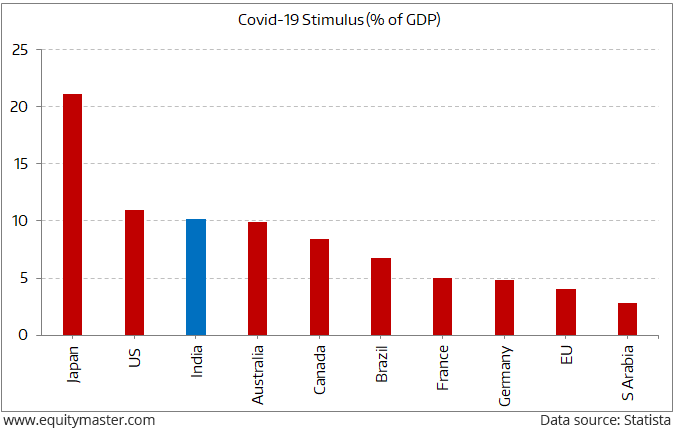Investment in securities market are subject to market risks. Read all the related documents carefully before investing
Grab Our Small Cap Recommendation
Service at a 60% Discount
- Home
- Todays Market
- Indian Stock Market News May 15, 2020
Indian Indices Extend Fall; M&M and Axis Bank Top Losers Fri, 15 May 12:30 pm
Share markets in India are presently trading on a negative note, tracking mixed cues from global equities.
Sectoral indices are trading mixed with stocks in the banking sector and automobile sector witnessing selling pressure, while metal stocks are witnessing buying interest.
The BSE Sensex is trading down by 271 points while the NSE Nifty is trading down by 68 points.
The BSE Mid Cap index is trading down by 0.3% and the BSE Small Cap index is trading down by 0.5%.
The rupee is trading at 75.54 against the US$.
Gold prices are currently trading up by 0.6% at Rs 46,912.
Note that the coronavirus impact has shaken markets worldwide. Businesses are seeing unprecedented shifts in a virus struck, locked down economy.
As per Richa Agarwal, editor of our premium smallcap service Hidden Treasure, there are robust smallcap businesses that are not just resilient but likely to emerge stronger from this crisis.
Richa has shared her views on these smallcaps, in the video below. Tune in now...
Moving on, market participants are tracking Aarti Drugs share price, Cipla share price and Tata Chemicals share price as these companies are scheduled to announce their March quarter results (Q4FY20) later today.
You can read our recently released Q4FY20 results of other companies here: Reliance Industries, Marico, Kansai Nerolac, NIIT Technologies, Persistent Systems, SKF India, Siemens, Mphasis, Maruti Suzuki, Godrej Consumer Products.
In news from the macroeconomic space, the government on Thursday announced Rs 3.16 trillion support for vulnerable sections, including migrant workers, farmers, tribals, street vendors, and the middle class.
The government announced nine measures on Thursday and three of them were targeted at migrant labourers.
Finance Minister Nirmala Sitharaman announced 5 kg of grains per person and 1 kg of pulses per family a month for two months for workers not enrolled under the National Food Security Act or states food schemes.
The finance minister announced a one-nation-one-ration card scheme that would cover 83% of workers who have ration cards.
She also announced a Rs 700 billion boost to the housing sector through a one-year extension of subsidised loans for affordable houses for the middle-income group with an annual income of Rs 6-18 lakh.
This was the third package and the second in a series after the Prime Minister announced a Rs 20-trillion package to help revive the economy.
In March, Finance Minister Nirmala Sitharaman had announced a package of Rs 1.7 trillion.
Unlike the previous stimulus packages, this one is no longer a tiny fraction of India's GDP.
This is the largest stimulus package ever announced by India.
At about 10.2%, it is among the biggest stimulus packages announced over the past few months by governments all around the world. This is evident in the chart below:
Now, executing the package, keeping India's long-term economic interests in mind, will be the key.
Moving on to news from the financial markets space, the markets regulator has relaxed norms for companies from complying with the 25% minimum public shareholding (MPS) norms.
In a circular on Thursday, the market regulator said, "it has been decided to grant relaxation from the applicability of the October 10, 2017 circular for listed entities for whom the deadline to comply with MPS requirements falls between March 1, 2020 and August 31, 2020."
The October circular lays down the procedure to be followed by stock exchanges with MPS non-compliant companies, their promoters and directors. The penal action includes fines and freezing of excess promoter holding.
Companies had approached the regulator through investment bankers and industry bodies, seeking relaxation citing unfavourable market conditions to conduct share sales.
As per a leading financial daily, there are over 70 companies where promoter shareholding is more than 75%.
This list is dominated by public sector undertakings (PSUs), some of which include GIC of India, Hindustan Aeronautics and New India Assurance.
Some private firms in the list include CreditAccess Grameen and Nippon Life MF.
The regulator's rules give promoters three years from the date of listing to bring down holding to 75%. If it goes past 75% because of acquisitions such as open offer or delisting, promoters get one more year to bring down the stakes.
The 25% MPS norms were introduced in 2013, whereby no listed company was permitted to have more than 75% promoter stake.
To know what's moving the Indian stock markets today, check out the most recent share market updates here.
For information on how to pick stocks that have the potential to deliver big returns, download our special report now!
Read the latest Market Commentary



Equitymaster requests your view! Post a comment on "Indian Indices Extend Fall; M&M and Axis Bank Top Losers". Click here!
Comments are moderated by Equitymaster, in accordance with the Terms of Use, and may not appear
on this article until they have been reviewed and deemed appropriate for posting.
In the meantime, you may want to share this article with your friends!